PakAlumni Worldwide: The Global Social Network
The Global Social Network
Pakistan's Fast Growing Hindu Population 5th Largest in the World
Contrary to the sensational media headlines about declining Hindu population in Pakistan, the fact is that Hindu birth rate is significantly higher than the country's national average. Although Hindus make up only 1.9% of Pakistan's population, it is among the worlds fastest growing Hindu communities today, growing faster than the Hindu populations in India, Nepal, Bangladesh and Indonesia.
|
|
Hindu Population in West Pakistan Source: Census Data `Pakistan Census data. For 1931 and 1941, the figures are for West Pakistan in undivided India. For 1951 and 1961, the figures are for West Pakistan in undivided Pakistan. Data for 1971 could not be accessed.
|
|
|
Top Countries With Hindu Populations Source: Pew Research Center |
Fastest Growing Religions By Countries |
Sindhi Hindu Woman |
Hindu fertility rate (TFR) of 3.2 children per woman in Pakistan is much higher than national fertility rate of 2.86. With 3.33 million Hindus, Pakistan is currently home to the world's 5th largest Hindu population. By 2050, Pakistan will rank 4th with 5.6 million Hindus, surpassing Indonesia which is currently ranked 4th largest Hindu country, according to Pew Research.
While it is true that some Pakistani Hindus have been targets of religious bigotry and intolerance by some in the majority Muslim community, there are also many many examples of mutual tolerance and respect between Hindus and Muslims in the country. In the city of Mithi in Sindh's Tharparkar district, for example, Muslims do not slaughter cows out of respect for their fellow citizens of Hindu faith, and Hindus, out of respect for Muslim rites do not have marriage celebrations during the month of Muharram. Hassan Raza, a student journalist, quoted a resident of a village near Mithi as saying:
"In our village, Hindus and Muslims have been living together for decades and there has not been a single day, when I have seen a religious conflict. No loud speaker is used for Azaan at the time when Hindus are worshiping in their temple, and no bells are rung when it is time for namaz. Nobody eats in public when it is Ramazan and Holi is played by every member of the village."
Diwali Celebration in Mithi, Pakistan |
Another example is Rohiri in Sindh where a visiting Canadian-Indian Hindu diplomat saw a thriving Hindu community. Here's an except of how he describes his visit to Rohiri:
"One of the most interesting elements of the trip was visiting my father’s town, Rohiri, his birthplace. I found there was still a sizeable Hindu community there. That totally took me by surprise. We still think there was a massive religious cleansing in Pakistan and there were no Hindus left. Then I came across this family of shopkeepers who said, “Don’t worry about anything. Stay with us.” They gave me lunch and dinner and put me on the night train to Lahore. Talking to this family in the neighbourhood where my father grew up and was married was fascinating. The question that came to mind was why did my father’s family leave Pakistan and why are these people still here? Official figures suggest 14 million people were displaced after partition and that half a million to a million people were killed. And yet 60 years later these Hindu people in Rohiri are still there. They felt connected to the place where they were born. In the three towns I passed through I kept meeting Hindus — traders, professionals. Their numbers were small, 300 or 400 families in each of these towns. They have their own places of worship. I dared to ask: “Are you happy here?” and they said, “Yes, this is the land where we were born.”"
Pakistani Fashion Designer Deepak Perwani in Karachi |
A successful Karachi-based Hindu Pakistani fashion designer Deepak Perwani said the following while talking to Indian media in 2012:
"People keep asking me, 'Oh you guys didn't migrate?', 'How are you treated there?' and so on. The questions show a lack of awareness." Perwani is part of Karachi's flourishing Hindu community, which is small but visible and influential even today. One lakh of Karachi's 1.3 crore population is Hindu.
As Perwani puts it, a lot of what people say about Pakistani Hindus shows "a lack of awareness".
Related Links:
Pakistani Textbooks Acknowledge Minorities' Contributions
Rising Tide of Intolerance Threatens Pakistan
Akhand Bharat Part of Indian Textbooks
Hindutva Distortions in Indian Textbooks
Fighting Agents of Intolerance in Pakistan
Muslim Scholars Must Fight Hate in Pakistan
South Asian Christians Celebrate Christmas in Fear
Quaid-e-Azam Mohammad Ali Jinnah's Vision
-
Comment by Riaz Haq on August 21, 2017 at 7:30am
-
Forced Marriage? Male Guardianship of Adult Women? Love Jihad? #India SC upholds controversial Marriage Annulment.
https://www.theguardian.com/global-development/2017/aug/21/india-an...
Widespread shock as supreme court endorses dissolution of union between woman from Hindu family and Muslim man and orders forced marriage inquiry
The woman, Akhila Ashokan, who prefers to be known as Hadiya, converted to Islam from Hinduism while studying medicine in Coimbatore in Tamil Nadu. Last year, she met Shafin Jahan, a Muslim, and they married in December. Her livid father went to the Kerala high court demanding that Hadiya be returned to his custody.
In May, the court nullified the wedding and forcibly sent Hadiya back to her parental home in Kottayam despite her express wish not to return. The controversial judgment said Hadiya was “weak and vulnerable, capable of being exploited in many ways” and that “her marriage being the most important decision in her life, can also be taken only with the active involvement of her parents”.
On Wednesday, the supreme court ruled that India’s National Investigation Agency, which investigates terrorism, must assess whether Hadiya converted freely to Islam or was part of a “love jihad” – a phrase used by some Hindu fringe groups to allege that Muslim men are forcing Hindu women into marriage.
Hadiya has had virtually no contact with anyone outside her parents’ home since May. Local reporters say she has no phone or internet access and the house is guarded by police officers. A police officer quoted in the local media said social isolation had made Hadiya depressed.
-
Comment by Riaz Haq on September 29, 2017 at 7:37am
-
In #Pakistan's #coal rush, some #women drivers break cultural barriers. #Hindu #Thar #energy #Sindh
http://www.reuters.com/article/us-pakistan-women-drivers/in-pakista...In Pakistan's coal rush, some women drivers break cultural barriers
Gulaban, a 25-year old mother of three, adjusts a fan before driving a 60-tonne truck, during a training session of the Female Dump Truck Driver Programme, introduced by the Sindh Engro Coal Mining Company (SECMC), in Islamkot, Tharparkar, Pakistan September 21, 2017. Picture taken September 21, 2017. REUTERS/Akhtar Soomro
As Pakistan bets on cheap coal in the Thar desert to resolve its energy crisis, a select group of women is eyeing a road out of poverty by snapping up truck-driving jobs that once only went to men.
Such work is seen as life-changing in this dusty southern region bordering India, where sand dunes cover estimated coal reserves of 175 billion tonnes and yellow dumper trucks swarm like bees around Pakistan’s largest open-pit mine.
The imposing 60-tonne trucks initially daunted Gulaban, 25, a housewife and mother of three from Thar’s Hindu community inside the staunchly conservative and mainly-Muslim nation of 208 million people.
“At the beginning I was a bit nervous but now it’s normal to drive this dumper,” said Gulaban, clad in a pink saree, a traditional cloth worn by Hindu women across South Asia.
Gulaban - who hopes such jobs can help empower other women facing grim employment prospects - is among 30 women being trained to be truck drivers by Sindh Engro Coal Mining Company (SECMC), a Pakistani firm digging up low-grade coal under the rolling Thar sand dunes.
Gulaban has stolen the march on her fellow trainees because she was the only woman who knew how to drive a car before training to be a truck driver. She is an inspiration to her fellow students.
“If Gulaban can drive a dump truck then why not we? All we need to do is learn and drive quickly like her,” said Ramu, 29, a mother of six, standing beside the 40-tonne truck.
Until recently, energy experts were uncertain that Pakistan’s abundant but poor-quality coal could be used to fire up power plants.
That view began to change with new technology and Chinese investment as part of the China-Pakistan Economic Corridor (CPEC), a key branch of Beijing’s Belt and Road initiative to connect Asia with Europe and Africa.
Now coal, along with hydro and liquefied natural gas, is at the heart of Pakistan’s energy plans.
SECMC, which has about 125 dump trucks ferrying earth out of the pit mine, estimates it will need 300-400 trucks once they burrow deep enough to reach the coal.
Drivers can earn up to 40,000 rupees ($380) a month.
Women aspiring to these jobs are overcoming cultural barriers in a society where women are restricted to mainly working the fields and cooking and cleaning for the family. Only this week in Saudi Arabia, a close ally of Pakistan, women were granted permission to drive for the first time ever, ending a ban that was supported by conservative clerics but seen by rights activists as an emblem of suppression.
Gulaban’s husband, Harjilal, recalled how people in Thar would taunt him when his “illiterate” wife drove their small car.
-
Comment by Riaz Haq on October 4, 2017 at 2:20pm
-
Kiran Sadhwani is the first Thari #Hindu #female engineer at #Thar #Coal Project in #Pakistan. #CPEC #Energy
https://tribune.com.pk/story/1521349/kiran-sadhwani-first-thari-fem...
Sadhwani, who belong to the Lohana – a Hindu community – was the first girl in her community to study engineering or even to attend a university. Born into a middle class family in Mithi, she received her primary and intermediate education in her hometown and later went on to study at Mehran University of Engineering Technology.
Apart from her work, Sadhwani loves to volunteer. For the first time in the country’s history, when the Sindh Engro Coal Mining Company (SECMC) launched its Female Dump Truck Driver Programme near the town of Islamkot in Thar, Sadhwani visited several villages to motivate women to apply for the job and empower themselves. “Not all women who are working as dumper drivers are poor or in dire need of money. It is just that they want to work and earn a living for themselves and improve the lives of their families,” she explained.
Sadhwani loves to play table tennis, read books and listen to music. In the future, she hopes to continue to work for Thar’s prosperity and development.
Out of 25 successful candidates, Sadhwani is the only female working at the site. “When I came for the final interview my father insisted I would have to commute every day as he wouldn’t allow me to live near the site where many other officers and workers live,” she said.
“I wanted to reside at the site so I could visit the mining site easily and learn in the field. I didn’t want to live in my comfort zone by just confining myself to office work so I persuaded my father to allow me to stay there,” she explained.
Sadhwani’s father, who then visited the site and met the officials at the site, allowed his daughter to live there. Now Sadhwani visits her home in Mithi every fortnight. “I was over the moon as I had got the opportunity and a platform to prove myself,” she said. In Tharparkar women are kept in their comfort zones and Kiran wanted to leave hers.
“Just like most parents, my parents also wanted me to study medical as engineering was too difficult a profession for a girl. It was the first challenge I faced but after continued efforts I succeeded in persuading them,” she explained. “I told them it’s not just medical or teaching professions where women can work and excel. It is actually their passion that leads to success,” Sadhwani said.
It is very important to change peoples’ mind-set, which is not an easy job in Thar, not even for the hundreds of non-governmental organisations working in the region.
-
Comment by Riaz Haq on February 5, 2018 at 7:23am
-
PPP nominates Thari Hindu woman to contest Pakistan Senate polls on general seat
https://www.dawn.com/news/1387270
Pakistan People’s Party has nominated Krishna Kumari, a Kolhi woman belonging to a remote village in Nagarparkar district of Thar, to contest for a general seat during the upcoming Senate election.
Kumari is a social activist who joined PPP along with her brother, who was elected chairman of union council Berano. She has reportedly been asked by the party leadership to file nomination papers to contest the upcoming Senate election on PPP ticket.
Born to a poor peasant Jugno Kolhi in February 1979, Kumari and her family members spent nearly three years in a private jail allegedly owned by the landlord of Kunri of Umerkot district. She was a grade 3 student at the time when held captive.
Kumari was married to Lalchand at the age of 16, when she was studying in 9th grade. However, her husband supported her in pursuing studies, as later in 2013 she did masters in sociology from Sindh University. She also actively participated and worked for the rights of downtrodden people of marginalised communities living in Thar and other areas.
When contacted, Kumari told Dawn that she was given assurances by senior party leaders that they would get her elected as Senator “to set a new precedent and empower women from remote areas and minority communities”.
Provincial minister Syed Sardar Ali Shah, MNA Dr Nafisa Shah, MPA Dr Mehesh Kumar Malani and other PPP leaders had requested the party leadership in this regard, she said.
"I was called by Bilawal Bhutto and Faryal Talpur a few days back. They said they will allot me the ticket to contest the election to become a senator on a general seat from Sindh," Kumari maintained.
Kumari said she has made all the arrangements and documentation needed to file her nomination papers after she was made the candidate by party leaders.
PPP lawmaker from Thar Dr Mahesh Kumar Malani, when contacted by Dawn, confirmed that the party had decided to give Kumari a ticket and hoped that a Kolhi girl — from the family of the valiant freedom fighter Rooplo Kolhi — would be elected with majority votes.
Rooplo Kolhi had waged a war against the invading British colonialist forces when they had attacked Sindh from Nagarparkar side in 1857. Subsequently, he was arrested and hanged by the Britishers on August 22, 1858.
Dr Malani termed it a great decision by the party chairman to select a Thari woman to represent Thar in the Upper House.
-
Comment by Riaz Haq on October 6, 2019 at 5:17pm
-
Hard Times Have #Pakistani Hindus Looking to #India, Where Some Find Only Disappointment. Current migration is because of #Modi’s open appeals to #Hindu identity in India. But lower #caste Hindus have been beaten for drinking water from upper caste well. https://www.nytimes.com/2019/10/05/world/asia/pakistan-hindu-india-...
This is not the Hindu paradise they had crossed the border to join, they said. This is not the India Mr. Modi promised them.
In Pakistan, local officials say the pressure for Hindus to weigh moving to India has not been this great since a wave of sectarian violence led many to migrate in the 1990s, after a Hindu mob in India tore down a 16th-century mosque, the Babri Masjid, leading to retaliatory attacks in Pakistan.
The current migration is because of Mr. Modi’s open appeals to Hindu identity in India, they say, stripping the country of the secular framework it was founded on to give supremacy to their religion.
Since Mr. Modi’s election victory, Pakistani Hindus say they have had an easier time obtaining religious or pilgrimage visas to India, which they can then convert to long-term visas if they seek Indian citizenship.
Though the exact number of Hindu migrants is hard to pin down, indications of a wider push to go to India can be seen in the numbers of those long-term visas. In 2018, the Indian government granted 12,732 long-term visas, compared with 4,712 in 2017, and 2,298 in 2016, according to the Ministry of External Affairs. About 95 percent of long-term visas are granted to Pakistani Hindus, officials say.
Millions of Hindus remained in Pakistan when Britain carved out the state from the subcontinent to create a Muslim homeland at independence in 1947. They were unwilling to abandon their homes and businesses, like the millions of Muslims who ended up on the Indian side during partition, where now about 200 million live.
-----------
Even among Pakistani Hindus who are considering going to India, there are very real reasons to hesitate.
Kumar is one who is torn. Though he was shaken by the recent violence in his hometown, he said he was still reluctant to pick up and leave when the trains start running again. He has said goodbye to neighbors who have migrated to India, only to see them return to Pakistan months or years later, disappointed.
Bhagchand Bheel is one of the disappointed. When he migrated to India in 2014, he was grateful to leave the violence and pressure of Karachi, Pakistan’s commercial hub. He boarded the Thar Express to Zero Point Station, the last stop before the border, where he and his family lugged their bags by foot into India, settling in a camp in the city of Jodhpur.
He was among his people, he thought, and could finally be free. But he is of a lower caste, and when he tried to enter a Hindu temple, he was barred entry by the priest because of it, he said. And when a friend tried to drink from the community water well, he was physically assaulted by upper caste Brahmins who accused him of polluting it.
“In Pakistan, the only thing that matters is if you are Hindu or Muslim,” said Mr. Bheel, whose last name is derived from his tribe. “Because we are Hindus, in Pakistan we were discriminated against. But in India, I face discrimination because I’m a Bheel.”
----------------
Mr. Bheel is wracked by doubt, the same doubt his grandfather had when he chose to keep the family in Pakistan during partition. Did he make the right choice?
He left his home and siblings in Karachi, trading a lucrative job as an administrator of a medical clinic there to live as a migrant in India. His medical diploma, one of the few possessions he brought with him, hangs proudly on a wall, although it is not valid in India. He struggles to make ends meet here.
-
Comment by Riaz Haq on December 12, 2019 at 4:55pm
-
No, Pakistan's non-Muslim population didn't decline from 23% to 3.7% as BJP claims
During the debate on the Citizenship Amendment Bill in Parliament, the BJP repeatedly claimed that population of religious minorities in Pakistan has declined from 23% in 1947 to 3.7% in 2011. Analysis of official data however shows this argument is faulty.
https://www.indiatoday.in/india/story/pakistan-bangladesh-non-musli...
Taking Pakistan's Census 1951 as benchmark for our analysis, we find that while raising the issue of religious persecution in Pakistan and Bangladesh, the BJP mixed-up data for the two regions.
Firstly, it said non-Muslims once comprised 23 per cent of Pakistan's population. The fact rather is that non-Muslims comprised 23 per cent of only East Pakistan's population, not the entire country. Taken together (East plus West Pakistan), share of non-Muslims was 14.20 per cent (the highest ever) in 1951.
Secondly, the BJP claimed that share of non-Muslims reduced from 23 per cent to 3.7 per cent in Pakistan. This too is incorrect because share of non-Muslims in Pakistan has hovered around 3.5 per cent from the first census onwards.
1951: 3.44 per cent
1961: 2.80 per cent
1972: 3.25 per cent
1981: 3.33 per cent
1998: 3.70 per cent
Thirdly, the BJP is correct in saying that the percentage share of non-Muslims has decreased significantly in Bangladesh. But it is wrong in saying that the decline was from 22 per cent to 7.8 per cent. As per official census data, the decline was from 23.20 per cent in 1951 to 9.40 per cent in 2011.
Fourthly, BJP has argued that religious persecution was the reason for decline of non-Muslim population in Bangladesh. There is no denying that religious minorities were brutally persecuted for decades in East Pakistan and later also in Bangladesh. It is a fact that hundreds of them were raped, murdered and forcibly converted into Islam.
-
Comment by Riaz Haq on March 11, 2020 at 1:26pm
-
In pictures: #Pakistani #Hindu community defy #coronavirus to celebrate #Holi2020 festival across the country. Thousands come out on streets to splash colours while #Muslim friends also join them https://gn24.ae/9897aec3eb00000
1 of 11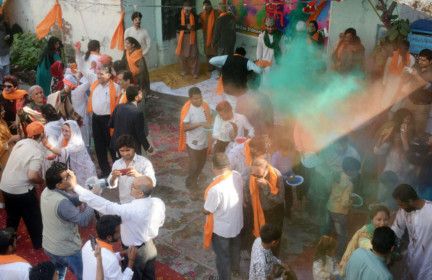
LAHORE: Members of Hindu community dancing and throwing colours during their Holi celebrations at Neela Gumbad G Sawami Temple in Lahore.Image Credit: Online
2 of 11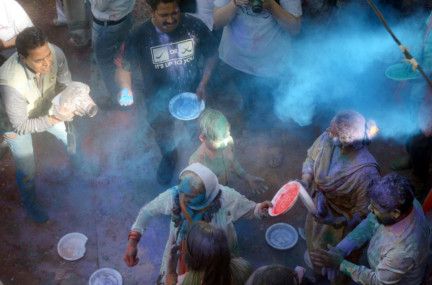
Holi celebrations in Lahore. Pakistan Prime Minister Imran Khan has sent his good wishes to the Hindu community on the occasion of their festival of Holi.Image Credit: Online
3 of 11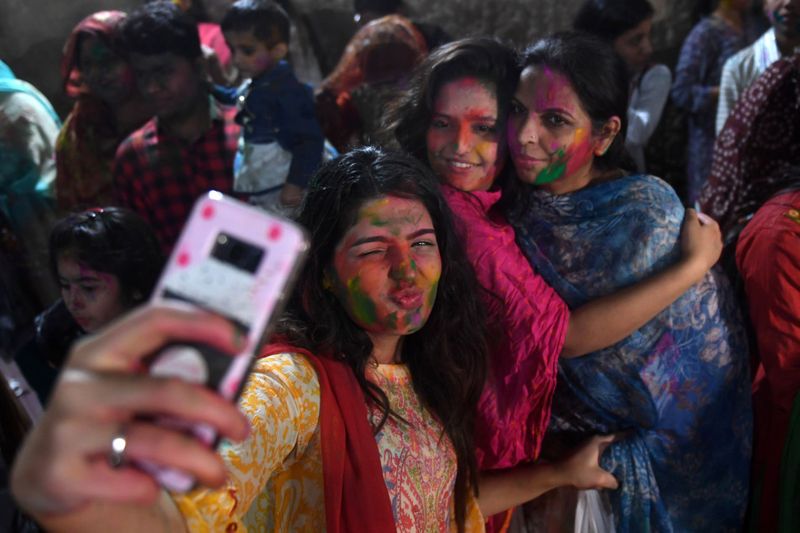
Pakistani Hindu celebrate the Holi festival in Karachi on March 9, 2020. Holi, the popular Hindu spring festival of colours is observed in India and across countries at the end of the winter season on the last full moon of the lunar month.Image Credit: AFP
4 of 11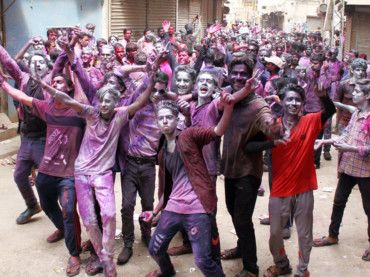
Members of Hindu community dancing and throwing colours during their Holi celebrations in Hyderabad. The festivities mainly happened in Hyderabad, the second largest city of southern province of Sindh. Temples were decorated with colours and special prayers were also offered there for development and prosperity of the country.Image Credit: Online
5 of 11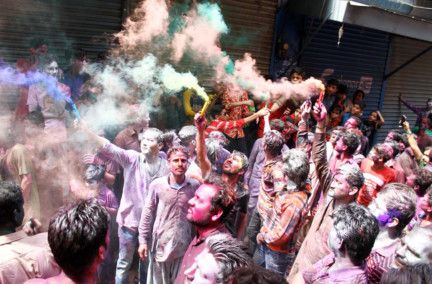
Jubilant Hindu community in Hyderabad during Holi celebrations. Holi marks the end of winter and the start of spring. This year, the Hindu community across the globe celebrated the day on March 9.Image Credit:
6 of 11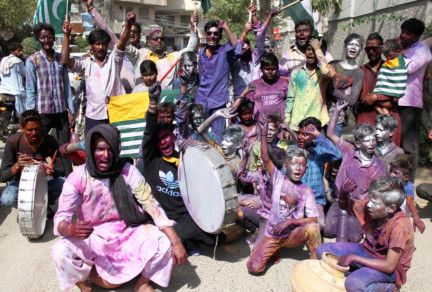
Hindu community members including young and old came together to celebrate Holi in Hyderabad.Image Credit: Online
7 of 11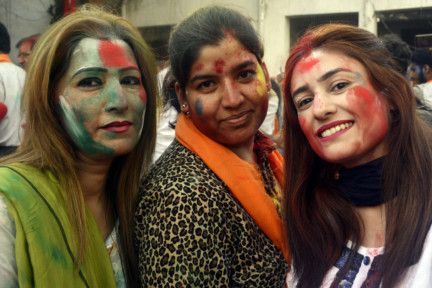
Hindu girls splashes colours to celebrate the Holi festival in Lahore. Hundreds of Hindu community members gathered at Neela Gumbad G Sawami Temple in Lahore to celebrate the event.Image Credit: Online
8 of 11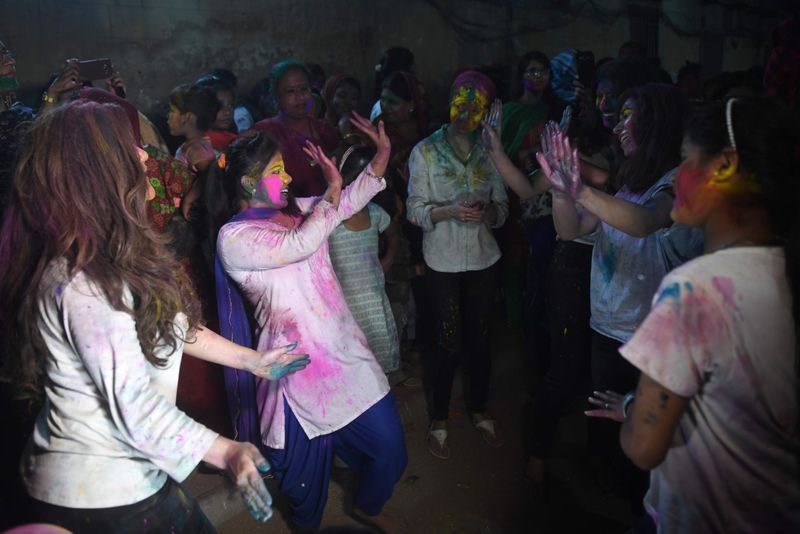
Pakistani Hindu celebrate the Holi festival in Karachi on March 9, 2020. Holi, the popular Hindu spring festival of colours is observed in India and across countries at the end of the winter season on the last full moon of the lunar month.Image Credit: AFP
9 of 11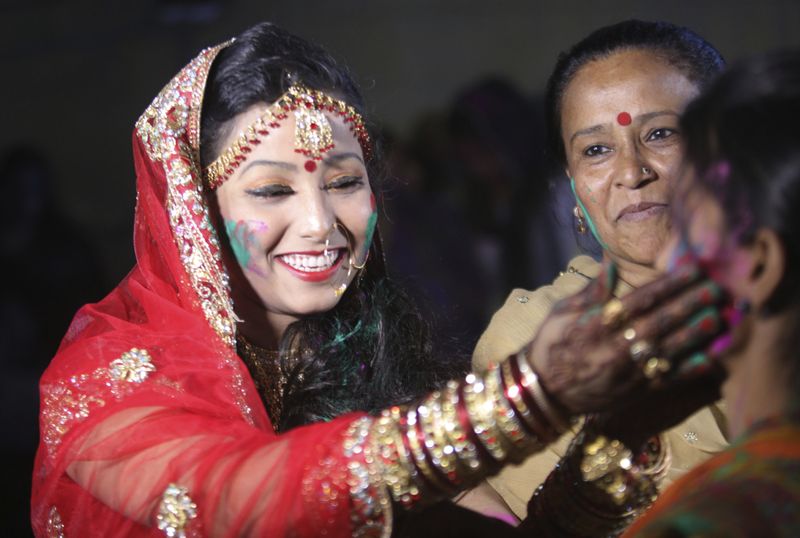
People from the Pakistani Hindu community smear each others faces with colours to celebrate Holi, the festival of colors, in Karachi, Pakistan, Monday, March 9, 2020. Holi festival marks the beginning of spring and the triumph of good over evil.Image Credit: AP
10 of 11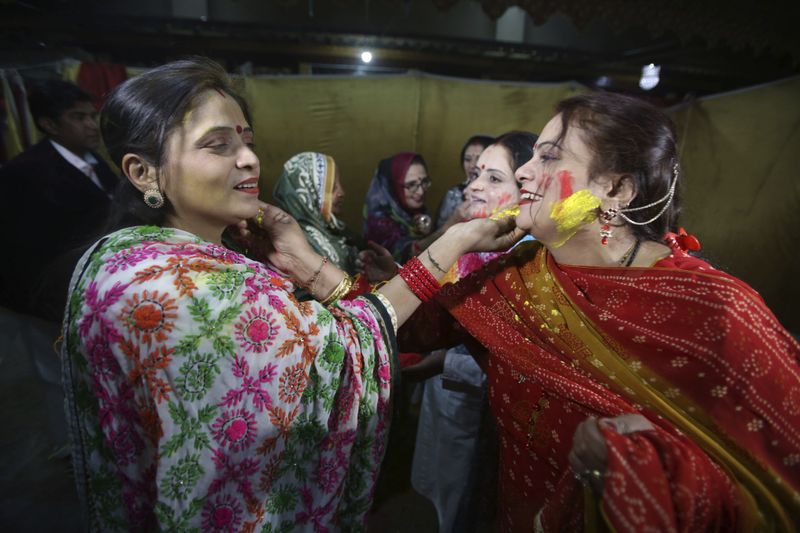
Women from the Hindu community celebrate Holi in Peshawar.Leaders and celebrities in Muslim dominated Pakistan this year have gone an extra mile to express good wishes and solidarity with the Hindu minority in Pakistan.Image Credit: AP
11 of 11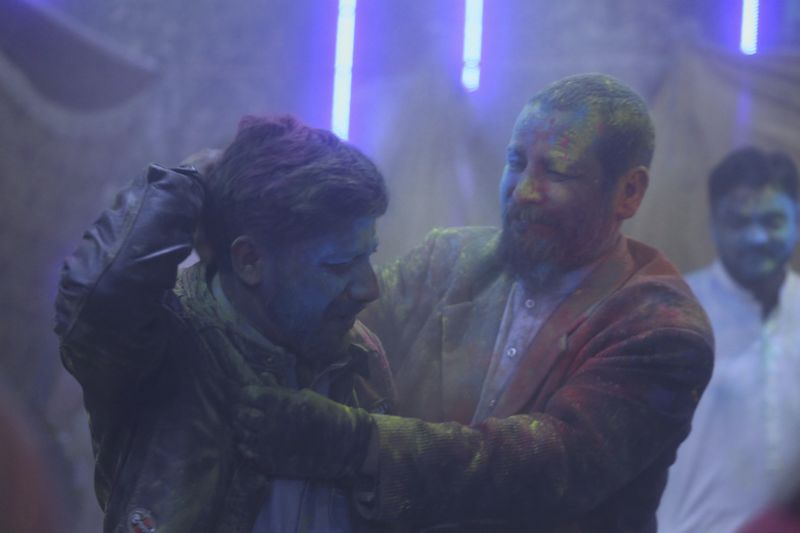
The festival of colours rejuvenates the spirit of fun, freedom, love, respect and happiness to blend myths with religion to promote harmony.Image Credit: AP
-
Comment by Riaz Haq on May 4, 2020 at 5:57pm
-
First #Hindu pilot in #Pakistan Air Force. Rahul Dev hails from #Tharparkar, the largest district in #Sindh province, where a large population of the Hindu community resides. | Pakistan – Gulf News
https://t.co/T4Wfd0NQZh?amp=1
Rahul Dev hails from Tharparkar, the largest district in Sindh province, where a large population of the Hindu community resides.
All Pakistan Hindu Panchayat Secretary Ravi Dawani expressed happiness over Dev’s appointment. He said many members of the minority community are serving in the civil service as well as the army. Many doctors in the country also belong to the Hindu community. He said that if the government continues to focus on the minorities, then in the coming days many Rahul Devs will be ready to serve the country.
-
Comment by Riaz Haq on August 5, 2020 at 11:42am
-
Most of #Pakistan's #Hindus are of lower caste #untouchables. When they migrate to #India, they face discrimination. They can not enter #Hindu temples, and assaulted for drinking from the community water well. India is no Hindu paradise for them. https://www.nytimes.com/2019/10/05/world/asia/pakistan-hindu-india-...
This is not the Hindu paradise they had crossed the border to join, they said. This is not the India Mr. Modi promised them.
Mr. Bheel is wracked by doubt, the same doubt his grandfather had when he chose to keep the family in Pakistan during partition. Did he make the right choice?
He left his home and siblings in Karachi, trading a lucrative job as an administrator of a medical clinic there to live as a migrant in India. His medical diploma, one of the few possessions he brought with him, hangs proudly on a wall, although it is not valid in India. He struggles to make ends meet here.
“You take these decisions sometimes out of excitement for what your life could be,” Mr. Bheel said, his daughter cuddling beside him on a bench. “Then you arrive and realize it’s much different on the ground.”
Mr. Bheel looked on as his wife struggled to contain rainwater leaking from the ceiling, after a monsoon swiftly obliterated the sunny sky. Eventually she gave up, running out of pots and buckets.
“Maybe this wasn’t the right decision for me,” he said. “But maybe my children will look back and say, ‘My father made the right choice.’”
----------------
Bhagchand Bheel is one of the disappointed. When he migrated to India in 2014, he was grateful to leave the violence and pressure of Karachi, Pakistan’s commercial hub. He boarded the Thar Express to Zero Point Station, the last stop before the border, where he and his family lugged their bags by foot into India, settling in a camp in the city of Jodhpur.
He was among his people, he thought, and could finally be free. But he is of a lower caste, and when he tried to enter a Hindu temple, he was barred entry by the priest because of it, he said. And when a friend tried to drink from the community water well, he was physically assaulted by upper caste Brahmins who accused him of polluting it.
“In Pakistan, the only thing that matters is if you are Hindu or Muslim,” said Mr. Bheel, whose last name is derived from his tribe. “Because we are Hindus, in Pakistan we were discriminated against. But in India, I face discrimination because I’m a Bheel.”
Like many Pakistani Hindus, Mr. Bheel migrated after Mr. Modi came to power in 2014, after a long campaign promoting Hindu nationalism.
Muslims in India say life has gotten progressively harder for them, too. Mr. Modi’s government is accused of turning a blind eye to the scores of Muslim men lynched by Hindu mobs. When an 8-year old Muslim girl was gang raped and killed in Kashmir last year by Hindu men, local police officers allegedly helped cover up the crime.
But despite the discrimination Muslims face in India, they do not tend to migrate to Pakistan in the numbers their Hindu counterparts in Pakistan do. Indian Muslims tend to migrate to the West instead.
In the Al Kausar Nagar migrant camp in Jodhpur, huts made out of thin, wispy branches, like birds’ nests, nestle in clusters, with quilts with vibrant Pakistani tribal designs hanging off their sides.
Bands of Pakistani Hindu women crouch over unfinished quilts, stitching away, hoping to sell them in the market to wealthier Indians. They complain that they receive little government assistance, siphoning what little electricity and water they can off municipal lines, and that the quality of public schooling for their children is not as good as it is in Pakistan, a main source of grievance for the many who migrated to give their children better opportunities.
-
Comment by Riaz Haq on August 5, 2020 at 1:44pm
-
A Pakistani Hindu Said He Didn’t Want to Live in India. Here’s Why
Akhil Bakshi met a Hindu Pakistani on a flight. This is what he learnt, much to his surprise.
AKHIL BAKSHI
https://www.thequint.com/voices/blogs/citizenship-amendment-act-nrc...
In August 2018, on my way back to India from Madagascar, I was off-loaded in Nairobi by Kenya Airways on two consecutive nights. On the second night, at the facilitation counter, I bumped into Ravi Kumar, a pleasant-looking and smartly attired man in his late twenties. After an hour of arguing with grim-faced, insensitive airline staff, I looked forward to engaging him in a refreshing conversation as we waited for the transport to drive us to our hotel.
As soon as we had exchanged pleasantries in Hindustani, he said, smiling wryly: “Let me clarify that I am not an Indian. I am a Pakistani.”
“A Hindu, no doubt,” exclaimed I.
“That's right,” he said, boldly.
‘It Must be Difficult for Your Family to Live in Pakistan?’
I looked him up and down, searching for scars on his face, grime in his hair, sadness in his eyes that revealed the fret in his heart. My mind was instantly filled with sorrow for my ‘long-suffering’ fellow Hindu who, surely, must be leading an ‘undignified’, ‘baleful’ existence in Pakistan. Weren't Hindus in Pakistan ‘thrown to the wolves’ by state tyranny? I wanted Ravi Kumar to share his agonies, and that of other helpless victims, with me.
“It must be difficult for your family to live in Pakistan?” I asked a leading question.
“On the contrary, we are extremely happy there,” he retorted, astonishing me.
“Are you not discriminated against?”
“Not at all! We feel like equal citizens. My family lives in Karachi and nobody has ever bothered us. We are a successful business family trading in rice.”
“But isn't the Hindu community in Pakistan generally impoverished?”
“Not in Karachi. We are probably the most prosperous community. The entire rice trade — milling, retail and wholesale — is controlled by Hindus. They all live in great comfort. I have relocated to Benin — from where I supply rice to West Africa.”
‘I’m a Pakistani at Heart. India is the Last Place I Want to Migrate to’
“Haven't you ever thought about relocating to India? Do you not want to free yourself of a dismal, perilous existence in Pakistan and migrate to India to seek succour of freedom and a liberal democracy?” I asked.
He looked at me with a hard stare but replied politely: “You are trying to put words into my mouth. Firstly, our life in Pakistan is not miserable. We are very much a part of the mainstream. I am a Pakistani at heart. Secondly, India is the last place I would like to migrate to. I have been to Bombay thrice — to source rice for West Africa — as Pakistan did not have enough surplus for export. All three times it has been a dreadful experience. Right from the time you land, you are questioned and hounded as if you are a terrorist. I had to report to the police station every day. And all that the authorities did was to pick my pockets. I spent most of my time waiting at police stations than at business meetings. I don't like the undignified way I am treated in India. Now I am on my way to source rice from Thailand — over-flying India.”
‘Pakistani Hindus Didn’t Find Kinship or Compassion in India’
“However, many Pakistani Hindus do want to migrate to India — to enjoy some measure of freedom that is proffered in my country,” I interjected.
“Perhaps. But those who went to India did not find any trace of kinship or compassion. The government provided no assistance to resettle. The lower caste Hindus were not allowed to pray in the temples. They can’t drink from the same well as the upper castes. Before you call Pakistan intolerant and petty, you should think about the bigotry in your own country.”
“I am told all Hindu temples have been vandalised...”
“A few were, some years ago, as a reaction to the demolition of some big mosque in India.”
“Babri Masjid.”
“Maybe. I don’t follow Indian news.”
Comment
- ‹ Previous
- 1
- 2
- 3
- 4
- Next ›
Twitter Feed
Live Traffic Feed
Sponsored Links
South Asia Investor Review
Investor Information Blog
Haq's Musings
Riaz Haq's Current Affairs Blog
Please Bookmark This Page!
Blog Posts
Pakistani Student Enrollment in US Universities Hits All Time High
Pakistani student enrollment in America's institutions of higher learning rose 16% last year, outpacing the record 12% growth in the number of international students hosted by the country. This puts Pakistan among eight sources in the top 20 countries with the largest increases in US enrollment. India saw the biggest increase at 35%, followed by Ghana 32%, Bangladesh and…
ContinuePosted by Riaz Haq on April 1, 2024 at 5:00pm
Agriculture, Caste, Religion and Happiness in South Asia
Pakistan's agriculture sector GDP grew at a rate of 5.2% in the October-December 2023 quarter, according to the government figures. This is a rare bright spot in the overall national economy that showed just 1% growth during the quarter. Strong performance of the farm sector gives the much needed boost for about …
ContinuePosted by Riaz Haq on March 29, 2024 at 8:00pm
© 2024 Created by Riaz Haq.
Powered by
![]()






You need to be a member of PakAlumni Worldwide: The Global Social Network to add comments!
Join PakAlumni Worldwide: The Global Social Network